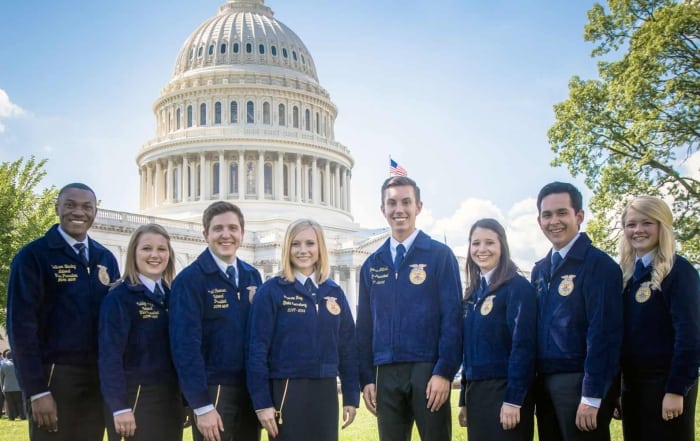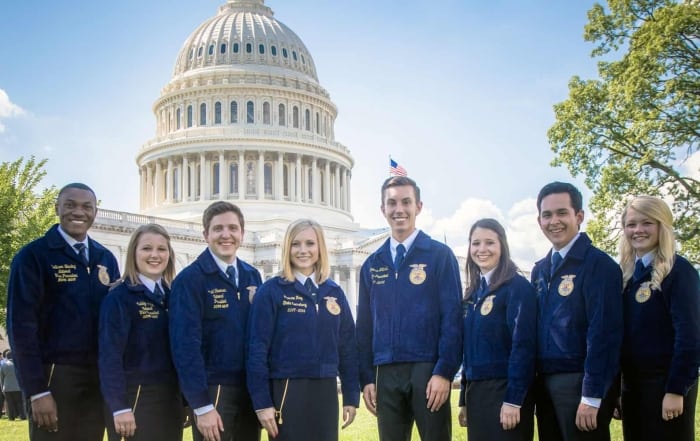FFA is the organization of, by and for students enrolled in agricultural education programs.
The National FFA Organization is an integral part of the organized instructional programs in agricultural education, which prepare students for a wide range of careers in agriculture, agribusiness and other agriculture-related occupations. FFA is structured on three levels—local, state and national. The National FFA Organization is led by a board of directors and six student national officers. Together, they act on recommendations from the national convention delegates and agricultural education’s stakeholders to set the vision and policy for FFA.
Just like chapter officers at the local level, the national officers represent the members and actively guide the course of the organization during their year of service. A president, secretary and four regional vice presidents are elected each year at the National FFA Convention & Expo.
The National FFA Organization is a research and support organization that does not select, control or supervise state FFA association, local chapter or individual member activities. Educational materials are developed by FFA in cooperation with the U.S. Department of Education as a service to state and local agricultural education agencies.
National FFA Constitution and Bylaws
The National FFA Constitution and Bylaws provide the founding principles, authority, objectives and procedures of the National FFA Organization.
State associations function within the constitution of the national organization but may also create individual leadership, award and competition programs. Chapters are chartered through their state organizations.
Proposed amendments to the National FFA Constitution and Bylaws may be submitted by a state FFA association, the board of student officers or the National FFA Board of Directors. Proposed amendments from a state FFA association must be submitted in writing to the national organization by January 1 for review by the National FFA Board of Directors. All proposed amendments to the National FFA Constitution and Bylaws must be submitted by the national advisor to the state FFA associations by March 1. The board of student officers shall present their recommendations concerning each amendment to the delegates at the national convention.
An amendment to the National FFA Constitution may be adopted by a two-thirds vote of the official delegates at the National FFA Convention. An amendment to the bylaws shall require a majority vote of the official delegates at the national FFA convention. Amendments to the bylaws must not conflict with the National FFA Constitution.
FFA Federal Charter
In 1950, the 81st Congress of the United States, recognizing the importance of FFA as an integral part of the program of vocational agriculture, granted a federal charter to FFA in Title 36 of United States Code. Congressional supporters believed a charter would give legal stability to the organization, protect the name and emblem and clarify the relationship between FFA and the Office of Education.
Over the years, the federal charter has served to publicly tie FFA and school-based agricultural education to the national priority of maintaining a safe and abundant food supply while protecting our natural resources. The role of education in securing a skilled, sustainable workforce in agriculture is underscored through the leadership provided by the U.S. Department of Education on the National FFA Board of Directors. The charter also provides federal authority to create an interagency working agreement between the U.S. Department of Education and the U.S. Department of Agriculture focused on strengthening FFA and school-based agricultural education.
Today, the federal charter clarifies the purposes of the organization and states the integral nature of FFA to the instruction of agricultural education in the United States. The charter ensures the student voice is incorporated into the organization’s administration through the leadership provided by FFA members on the national level, supports the engagement of business and industry, and promotes the development of productive citizens.
In 1998, the 105th Congress reviewed and passed technical amendments to the FFA Federal Charter as part of Public Law 105-225. In 2019, the 116th Congress reviewed and passed additional amendments to the FFA Federal Charter as Public Law 116-7, specifying the integral nature of FFA to the instruction of agricultural education in the United States.
RELATED STORIES
Modernized National FFA Federal Charter Signed Into Law
The charter strengthens the integral nature of agricultural education, leadership development through FFA, and experiential learning for students.
FFA Constitution and Bylaws Committee Meets in Indianapolis
During its May 2018 meeting, the National FFA Board of Directors called for a special task force to meet and consider revisions to the National FFA Constitution and Bylaws.
Support the FFA Federal Charter Revision
FFA needs your support of legislation that promises a skilled, sustainable workforce of students prepared for 21st century careers in agriculture.
National FFA Presents Bill to Amend Federal Charter
A new bill amending the federal charter of the National FFA Organization is now working its way through Congress.




